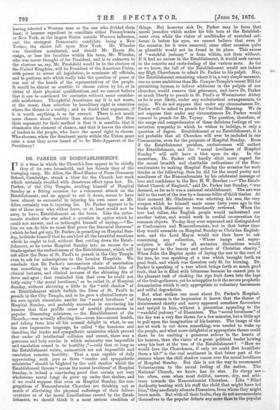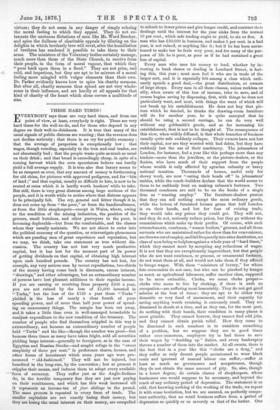DR. PARKER ON DISESTABLISHMENT.
IT is a time in which the Church's foes appear to be chiefly they of its own household, and her friends they of the besieging camp. Mr. Allen, the Head Master of Perse Grammar School, Cambridge, struck a blow for the Church last week which certainly recoiled with disastrous effect upon her. Dr. Parker, of the City Temple, availing himself of Hospital Sunday as a fitting occasion for a vehement attack on the Establishment, and an appeal to cut it down, seems to have been almost as successful in injuring his own cause as Mr. Allen certainly was in injuring his. Dr. Parker appears to be one of those men who either have, or at least would not be sorry to have, Establishment on the brain. Like the unfor- tunate student who was asked a question in optics which he could not answer, and so bethought himself of saying,—" Be- fore we can do this we must first prove the binomial theorem" (which he had got up), Dr. Parker, in preaching on Hospital Sun- day, bethinks himself that he can't feel all the beautiful emotions which he ought to feel, without first cutting down the Estab- lishment, so he turns Hospital Sunday into an excuse for a tirade against the exclusiveness of the Establishment, which will not allow the Dean of St. Paul's to preach in the City Temple even to ask for subscriptions to the London Hospitals. We conclude that Dr. Parker's unconscious chain of association was something in this wise :—Hospitals reminded him of clinical lectures, and clinical lectures of the shivering fits of fever and ague ; that reminded him that even he could not fully enjoy "the moral loveliness," as he called it, of Hospital Sunday, without shivering a little in the "cold shadow" of an Establishment which forbids the Dean of St. Paul's to preach in the City Temple, and so he gave a clinical lecture on his own aguish sensations amidst the " moral loveliness" of Hospital Sunday, and probably succeeded in convincing his hearers that that prolific cause of morbid phenomena in popular Dissenting ministers, — the Establishment of the Church,—was actually affecting his—even his—moral health, and taking from him all his normal delight in what, to use his own impressive language, he called " the heroisms and charities, the tender and sympathetic ministries which proved that under all intellectual collision and unrest, there was a generous and holy service in which animosity was impossible and emulation ceased to be hostility ;"—only that so long as the Establishment exists, animosities are not impossible and emulation remains hostility. That a man capable of duly appreciating such joys as these "tender and sympathetic ministries ' should be blighted by the cold shadow which the Establishment throws " across the moral loveliness" of Hospital Sunday, is indeed a convincing proof that certain not very wholesome moral fungi do grow up under that shelter, and if we could suppose that even on Hospital Sunday, the con- gregations of Nonconformist Churches are thinking not so much of alleviating the physical sufferings of their fellow- creatures as of the moral humiliations caused by the Estab- lishment, we should think it a most serious condition of things. But however sick Dr. Parker may be from that moral jaundice which makes his bile turn at the Establish- ment even while the vision of multitudes of wretched suf- ferers is before his eyes, we cannot believe that even if the occasion for it were removed, some other occasion quite as plausible would not be found in its place. This excess of "watchful jealousy" is from within, not from without. If it had no excuse in the Establishment, it would seek excuse in the conceits and caste-feeling of the various sects. As far as we know, the fall of the Establishment would not induce any High Churchman to admit Dr. Parker to his pulpit. Nay, the Establishment remaining where it is, a very simple measure, one no more ambitious than Mr. Cowper-Temple's recent Bill for permitting laymen to deliver addresses in the pulpits of our churches, would remove this grievance, and leave Dr. Parker as much liberty to preach in St. Paul's or Westminster Abbey as he is ever likely, under any ecclesiastical arrangements, to enjoy. We do not suppose that under any circumstances Dr.
Parker will be asked to preach for Cardinal Manning. We do not suppose that under any circumstances Dr. Parker would consent to preach for Mr. Voysey. The question, therefore, of the range and comprehension of these delicious feelings of un- sectarian sympathy in which he wishes to indulge, is only a question of degree. Establishment or no Establishment, it is not probable that all Churches will ever be included in one Communion, even for the purposes of Hospital Sunday. Even if the Establishment perishes, exclusiveness will outlast the Establishment, and the " moral loveliness of Hospital Sunday " will still have a blot upon its sky. In the meantime, Dr. Parker will hardly elicit more regard for the moral breadth and charitable enthusiasm of the Non- conformists by making Hospital Sunday the occasion for such tirades as the following, than he did for the moral purity and manliness of the Nonconformists by his celebrated message of love and confidence to the Rev. H. W. Beecher :—" The Estab- lished Church of England," said Dr. Parker last Sunday, " was doomed, so far as it was a national establishment. The axe was laid to the root of the tree by a famous feller of thick timber. At that moment Mr. Gladstone was whetting his axe, the very weapon which he himself made some forty years ago in the books which Macaulay so trenchantly reviewed. When the tree had fallen, the English people would understand one another better, and would work in cordial co-operation for common objects. To-day they were separated and distinguished as Conformists and nonconformists, but in that better time they would assemble on Hospital Sunday as Christian English- men, and the Lord Mayor would not then have to ask concerning any collection, ' Whose image and super- scription is this?' for all sectarian distinctions would be merged in the beauty and ardour of Christian charity." When John the Baptist spoke of laying the axe to the root of the tree, he was speaking of a tree which brought forth no good fruit, and which was therefore only fit for burning. Dr. Parker is speaking of a tree which brings forth so much good fruit, that he is filled with bitterness because he cannot join in the pleasant task of shaking the ripe fruit down into the laps of the fruit-gatherers, yet he misapplies to it the severe prophetic denunciation which is only appropriate to voluntary barrenness and wilful degradation.
But what strikes one most about Dr. Parker's Hospital- Sunday sermon is the impression it leaves that the theme of disinterested charity and mercy appeared somehow flavourless and insipid to him, without a peroration appealing to the "watchful jealousy" of Dissenters. The "moral loveliness" of the day was a very fine theme for a few minutes, but a little apt to pall upon the imagination of his hearers. The image of the axe at work to cut down something, was needed to wake up the people, and what more delightful or appropriate theme could there be for exciting a generous ardour in the hearts of his hearers, than the vision of a great political leader hewing away his best at the tree of the Establishment " How we would love the Churchmen, if only we could first humiliate them a bit I" is the real sentiment in that latter part of the sermon where the chill shadow comes over the moral loveliness of Hospital Sunday. But this is not the way to recommend Voluntaryism to the moral feeling of the nation. The National Church, we know, has its sins. Its clergy are — too often, even when most dutiful, narrow, dry, and arbi- trary towards the Nonconformist Churches. Like " Blind Authority beating with his staff the child that might have led him," they needlessly alienate Dissenters, from whom they might learn much. But with all their faults, they do not accommodate themselves to the popular defects any more than to the popular
virtues ; they do not seem in any danger of simply echoing the moral feeling to which they appeal. They do not ex- tenuate the unctuous flirtations of men like Mr. Ward Beecher, and spice the dullness of charitable appeals by dilating on the delights in which brotherly love will revel, after the humiliation of brethren has rendered it possible to take them to their arms. The ministers of the Voluntary bodies certainly manage, much more than those of the State Church, to receive from their people, in the form of moral vapour, that which they " pour back upon them in a flood." They are not prim, and cold, and imperious, but they are apt to be mirrors of a moral feeling more mingled with vulgar elements than their own. Dr. Parker evidently knows how to spice his charity sermons. But after all, charity sermons thus spiced are not very whole- some in their influence, and are hardly at all appeals for that kind of charity of the heart which alone covers a multitude of sins.

































 Previous page
Previous page